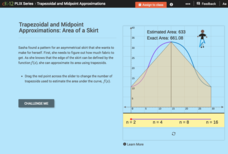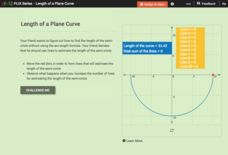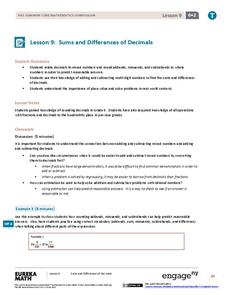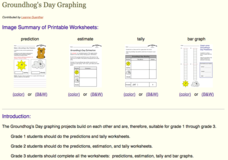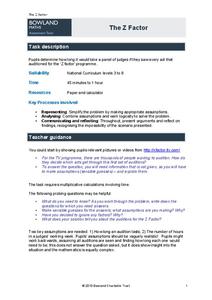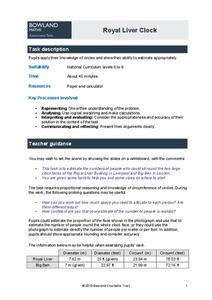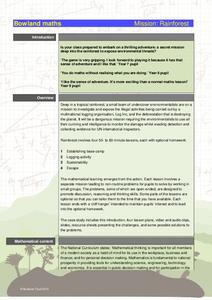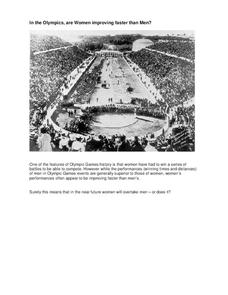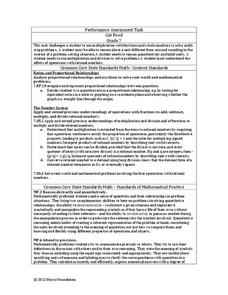CK-12 Foundation
Trapezoidal and Midpoint Approximations: Area of a Skirt
When are trapezoids better than rectangles? Using trapezoids pupils approximate the area of fabric defined by a function. Just like with rectangles, learners realize the more trapezoids the more accurate the approximation. Scholars use...
CK-12 Foundation
Length of a Plane Curve
Challenge your class to use straight lines when estimating the length of a curve. An engaging interactive allows individuals to place line segments one after another along the arc. Learners determine that the more lines used, the better...
CK-12 Foundation
Method of Cylindrical Shells
Approximate the volume of a solid of revolution. Using a method similar to approximating the area under a curve, pupils investigate the volume of a solid of revolution. The learners use a given definite integral to find the volume of...
CK-12 Foundation
Area Sums: Estimation with Rectangles
The more rectangles, the better the estimate. Using the interactive, pupils explore estimating the area under a curve using left-hand sums. Learners respond to challenge questions on how to get better estimates using the same technique.
Education World
Predicting Pumpkins
If you want more pumpkin seeds, you should get a bigger pumpkin—right? Young harvesters use estimation skills to make a hypothesis about how many seeds they will find in a pumpkin before examining the real number inside.
CK-12 Foundation
Square Roots and Irrational Numbers: Estimating Radicals
Try out a resource using triangles to estimate radicals. An interactive app allows learners to approximate some irrational numbers involving square roots. They find the two consecutive numbers that an irrational number lies between...
EngageNY
The Division Algorithm—Converting Decimal Division into Whole Number Division Using Fractions
Knowing the standard algorithm opens up a whole new world of division. Scholars learn how to convert division involving decimals to division involving whole numbers to use the standard algorithm. Knowing how to multiply with powers of...
EngageNY
Estimating Digits in a Quotient
Boiling down any division problem to a one-digit divisor problem sure makes estimation easy. The lesson shows how to estimate division problems by using place value understanding and basic arithmetic facts to simplify the division. Some...
EngageNY
Fraction Multiplication and the Products of Decimals
Class members come up with a hypothesis on the number of decimal digits in the product of two decimals. Learners work in groups to complete several decimal multiplication problems. The results help groups develop a conjecture on the...
EngageNY
Sums and Differences of Decimals
Sometimes dealing with decimals is so much easier than dealing with fractions. The ninth lesson in a 21-part module has the class consider situations when it might be easier to add or subtract fractions by first converting to...
California Mathematics Project
Meteorology
See how estimation is essential to making temperature weather maps. Scholars use ratios and rates of change to estimate temperatures at locations where temperature readings have not been made. They connect this idea to linear functions.
Balanced Assessment
Fermi Estimates I
Enrico Fermi, the physicist responsible for the first nuclear detonation, was known for his ability to estimate with little or no data. Use this task to have your classes practice their Fermi skills. They estimate the magnitude of three...
Mathed Up!
Scatter Graphs
Make an estimate by getting in line. The class works with scatter plots and lines of best fit to make an estimate for given values. Pupils determine whether there is a positive or negative correlation and draw a best-fit line. Using the...
Balanced Assessment
Fermi Estimates II
How many hot dogs does Fenway Park go through in a year? Learners estimate answers to this question and more as they work through the task. Problems require participants to make assumptions and use those assumptions to make estimations.
Balanced Assessment
Pizza Toppings
Pupils work with a pizza shop's menu to determine the total number of pizzas possible from their ingredient list, how much the pizzas would cost, and how long it would take to eat all of them. The assessment concludes by having scholars...
Kid Zone
Groundhog's Day Graphing
This Groundhog's Day, challenge scholars to predict, estimate, tally, and graph in a weather-themed instructional activity in which class members play the role of the groundhog to forecast the weather come February second.
Balanced Assessment
Catenary
Develop a model for a hanging chain. Pupils find a mathematical model for a hanging chain and then they compare their models to the precise function that models the curve. Scholars come up with a strategy to determine how close...
Balanced Assessment
Fermi Area
Discover creative ways to use surface area formulas. In the assessment task, scholars apply estimation strategies to determine surface area in non-routine problems. They consider surface area of kitchen sponges, rock salt crystals, and...
Bowland
You Reckon?
Sometimes simple is just better. A set of activities teaches young mathematicians about using plausible estimation to solve problems. They break problems down to simpler problems, use rounding and estimation strategies, and consider...
Bowland
The Z Factor
Young mathematicians determine the number of hours it would take judges of the "Z Factor" television talent show to watch every act. Participants make estimates and assumptions to solve the problem.
Bowland
Royal Liver Clock
Using clocks as dining tables? Scholars estimate the number of people that can sit around the face of the clock on the Royal Liver Building in Liverpool. They use estimation to justify their responses.
Bowland
Mission: Rainforest
Young environmentally conscious mathematicians solve a variety of problems related to the central theme of uncovering illegal logging activities. They determine a base camp based on given constraints, investigate logging activities and...
Bowland
In the Olympics, are Women Improving Faster than Men?
Will the time come when women outperform men at the Olympic Games?Scholars investigate gender differences in Olympic Games performances. They study the historical participation of women and then analyze data to determine if women will...
Noyce Foundation
Cat Food
Determine the right mix of cans of cat food. The resource consists of an assessment task to determine the cost to feed two cats for a specific number of days and requires scholars to interpret remainders within a context....


